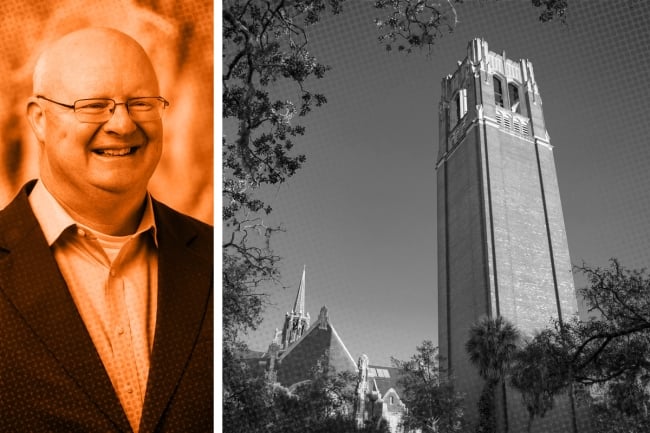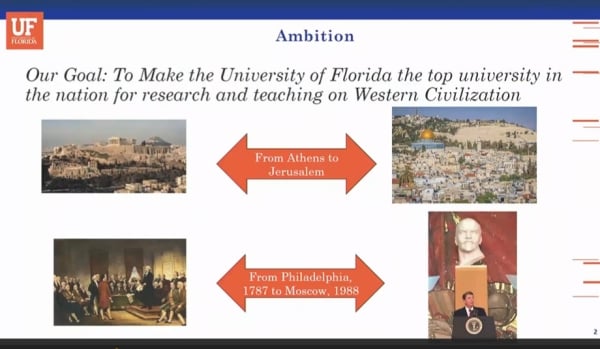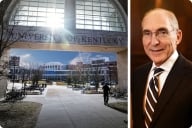You have /5 articles left.
Sign up for a free account or log in.

William Inboden directs the Hamilton Center for Classical and Civic Education, which Republican politicians created at the University of Florida.
In the summer of 2022, Florida newspapers reported on the strange appearance of $3 million in one-time funds from Florida’s GOP-controlled state Legislature for something called the Hamilton Center for Classical and Civics Education at the University of Florida. The university said it hadn’t asked for this new entity.
Two years later, this center—backed by Florida governor Ron DeSantis and now embraced by university officials—is rapidly expanding to become a UF college. But the center has remained beset with controversy, from its murky origins to university investigations of its alleged faculty opponents to a summer Faculty Senate approval of its degrees that left some professors feeling “railroaded.”
DeSantis’s 2023 conservative takeover of New College of Florida has alarmed faculty members across the country. But that’s a relatively small liberal arts institution. What the governor and other Florida Republicans have now built at UF represents a different, and increasingly popular, approach: establishing a legislatively mandated entity on the campus of a top public research institution.
In 2016, Arizona State University became the first public institution to receive an order and funding from a state Legislature to establish a department “of civic thought and leadership,” said Paul Carrese, founding director of what became the School of Civic and Economic Thought and Leadership. (Asked whether he accepts the “conservative” label, Carrese said, “It would now be called conservative in higher education, in humanities and social sciences, to have openly a positive disposition toward America.”)
Conservative-leaning think tanks and centers such as Stanford University’s Hoover Institution long predated ASU’s department. But Carrese said the phenomenon of Republican lawmakers and, in some cases, university governing boards mandating civics-focused centers began at ASU, and there are now 13 public university campuses across eight states, including in North Carolina, Tennessee and Texas, with similar entities teaching about the founding fathers, Greek philosophers and more. Carrese said his center once had the largest faculty, but not anymore.
The first Hamilton Center professors began teaching at UF this past spring. Director William Inboden said he expects to staff up to about 34 tenured or tenure-track faculty members this coming academic year, reach 50 eventually and be able to offer five majors, campus speakers and other programming.
The center receives $10 million annually from lawmakers, and that’s atop the $3 million Inboden said he has raised for the center from private sources so far. The Legislature has further pledged $47 million to renovate the historic campus Infirmary Building to house the college.
Is it a conservative center? Inboden said, “One of our academic goals with the Hamilton Center is to depoliticize higher ed” and that the proto-college’s “academic project really is pre-political.” He said it focuses on “cultivating academic virtues” that are “upstream” from political life, such as citizenship.
But the Hamilton Center’s founding and expansion—at the behest of the anti-“woke” DeSantis and Florida’s Legislature—has been political by definition, however. Inboden says he’s been friends for 30 years with the man who hired him to lead the center: outgoing UF president Ben Sasse, a former Republican U.S. senator. (Inboden said he trusts that his own qualifications speak for themselves.)
Meera Sitharam, president of the United Faculty of Florida union’s UF chapter, invoked the analogy that goes something like this: If something looks, walks and talks like a duck, it might be one. “You look at who’s there, who they’re hiring and what’s the buzz around the center, what other people are saying around the center, including other people who were instrumental in setting up the center,” Sitharam said. “Should I just completely dismiss all that?”
Born From Bills
Last year, The Chronicle of Higher Education unraveled part of the mystery behind the Hamilton Center’s seemingly out-of-the-blue appearance in the state budget. It reported that the Council on Public University Reform, a tax-exempt nonprofit with no website or public visibility, hired a lobbyist, Adrian Lukis, a former DeSantis chief of staff, to advocate for the center’s founding and funding. In January 2022, Lukis emailed a proposal for the center to a university administrator.
The first bullet point at the top of the proposal said UF should create an academic unit to increase “the political and intellectual diversity of the UF faculty.” The proposal’s “rationale” said the university’s truth-seeking mission was threatened by “cancel culture and uniformity of opinion on campus.”
Perhaps anticipating UF faculty opposition to the Hamilton Center, the plan said, “Existing departments should not have the authority to block the appointment of externally recruited faculty” for the center. That year, state lawmakers passed a law creating the center and providing $3 million for it.
The university began hiring faculty members for the center under its founding director, John Stinneford, a UF law professor who’s now a senior fellow at the center. While Stinneford said deans and center directors are usually given hiring authority at UF, then provost Joe Glover asked, and Stinneford agreed, to let Glover have the final sign-off for the center’s first faculty members. This was a response, Stinneford said, to criticism that the center was a “political, right-wing, anti-intellectual sort of center that would not meet the scholarly standards that are normally expected of a department at UF.”
“The goal was to hire the very best people available, so it’s not just a large number of people but it’s very, very high-quality people,” Stinneford said. He said he consulted “pre-eminent scholars” from other institutions who served on the Hamilton Center board, plus other scholars at UF and elsewhere, in order to make his recommendations. The provost approved them all, Stinneford said.
In late 2022, the UF Board of Trustees hired Sasse as the university’s president, and he immediately took an interest in the center. Stinneford said that for the final group of faculty members hired under his directorship, “Sasse personally reviewed the files and authorized the hires.” Nine new faculty members thus joined the university.
In January 2023, DeSantis unveiled his plans to expand the center in a big way. “Today, Governor Ron DeSantis announced legislation for the 2023 [legislative] session to further elevate civil discourse and intellectual freedom in higher education, further pushing back against the tactics of liberal elites who suppress free thought in the name of identity politics and indoctrination,” said a Jan. 31 news release. “Amongst its many provisions, the legislation will ensure Florida’s public universities and colleges are grounded in the history and philosophy of Western Civilization.”
The release said the governor’s budget recommendations included “$5 million in operations and $13 million for capital needs for the Hamilton Center”—and that it would be renamed a college.
Higher education discussion during Florida’s 2023 legislative session focused on a controversial proposal prohibiting Florida public colleges and universities from spending state or federal money on diversity, equity and inclusion. That ban passed as part of Senate Bill 266.
The sprawling law also required UF to annually report to the Legislature on the center’s progress toward becoming a “permanent college.” The Legislature ended up granting $10 million in annual recurring funds, doubling DeSantis’s earlier request.
In the summer of 2023, Sasse announced that Inboden, his friend and a former University of Texas at Austin professor, would take over directing the rapidly expanding center. When its faculty members began teaching classes in spring 2024, Sasse and Inboden co-taught a course called The American Idea.

A slide from William Inboden's presentation to the University of Florida Board of Trustees.
William Inboden
“President Sasse and Provost [J. Scott] Angle have been unequivocal, unwavering, very enthusiastic in their support in all sorts of ways,” Inboden told the UF Board of Trustees at a March 2024 meeting. The American Idea was among 29 courses that Hamilton Center faculty members were already teaching to about 600 students, Inboden said.
“The top-line goal with the Hamilton Center is to make the University of Florida the top university in the nation for research and teaching on Western civilization,” Inboden said.
At the end of Inboden’s presentation, Sasse told the board that “we’ve had some inquiry from reporters, saying, ‘Is this a right-wing movement in academia?’ And the answer is absolutely, unequivocally, no.”
That same month, some faculty members received notices that they were under a mysterious university investigation. When the United Faculty of Florida union asked what the probe was about, the university, according to an email the union provided, responded that it was for reportedly interfering with the center.
Investigations and a Summer Senate Meeting
Stan Kaye, a retired union member and a professor emeritus at UF, said he received a call this past spring from a professor, whom he declined to name. Kaye, a member of the union’s grievance council, said the professor had received a letter saying he was facing an investigation.
“There was no mention of what the violation was or who the complainant was in the early days,” Kaye said. He said he asked the professor for any inkling of what the investigation might concern. According to Kaye, the professor said it might relate to the professor telling a student he couldn’t enter a doctoral program because it was full and—though he could apply for the subsequent academic year—that policy forbade the student’s request to have someone from the Hamilton Center chair his doctoral committee.
The union eventually learned that the investigations were targeting six faculty members. In a March 11 email provided by another union member, a UF administrator confirmed that the investigations related to the Hamilton Center.
College of Liberal Arts and Sciences (CLAS) dean Dave Richardson requested the investigation, the administrator wrote, “due to his concern that the action or inaction of individuals may have disrupted or interfered with the academic freedom of students to affiliate with the Hamilton Center, or may have interfered with the Hamilton Center’s ability to establish or have curriculum approved or otherwise fulfill it’s [sic] mission.”
On March 21, Sasse wrote to the Faculty Senate that he and Angle, the current provost, had met with Richardson “to discuss some concerning issues in CLAS.” Sasse wrote that Richardson “acknowledged some egregious actions by others in (CLAS) and is working to get to the bottom of it.”
Kaye said, “Nobody on the campus knew what the hell he was talking about,” but he believes it was a veiled reference to the investigations. (In an email, a university spokesperson said the investigations were “not something President Sasse or Provost Angle initiated” and further said, “We don’t comment on personnel matters.”)
After the union issued cease-and-desist letters, and after a multimillion-dollar UF donor exerted pressure to stop the investigations, the university dropped them after about two months, Kaye said. The Independent Florida Alligator student newspaper previously reported on the dropped investigations.
The university provided Inside Higher Ed a May 24 letter saying an investigation “is not moving forward,” but it gave no further explanation. That letter was addressed to Sid Dobrin, chair of the UF English department and one of those the union said was targeted. Another professor targeted was John Krigbaum, undergraduate coordinator for CLAS. (Krigbaum didn't respond to requests for comment, and Dobrin said he couldn't comment.)
While alleged opponents of the center were being investigated, Richardson was rallying support for it, the union said. Churchill Roberts, a professor in the UF College of Journalism and Communications and chair of the union’s grievance committee, said that Dobrin, either while being interviewed during the investigation or in a conversation with Roberts himself, said he and other chairs in CLAS had received a letter from Richardson for them to sign. Roberts called it “basically a pledge of cooperation.”
According to a copy Kaye provided, they were template letters in support of the center’s first degree programs. “We believe that the Hamilton Center curriculum will provide a unique opportunity for students interested in these areas and will complement our department’s offerings nicely,” the letters said. “We have no objection to the implementation of these courses and degrees.” It’s unclear whether the chairs signed off.
It was a railroad job."
Stan Kaye, professor emeritus, retired union member
While the UF faculty members who predated the center, other than Stinneford, didn’t have authority over whom it would hire, normal procedure required Faculty Senate approval of the center’s degree programs. In May, those first two majors, Great Books and Ideas and Philosophy, Politics, Economics and Law, first came before the Senate. Sarah Lynne, the Senate chair, told Inside Higher Ed that, per normal procedure, the majors were thus set to come up for a vote at the next Senate meeting.
What wasn’t normal procedure was when Lynne called that next meeting to occur: the very next month, in June. It was Lynne’s first meeting as chair, and she supports the center.
Lynne said she called the special summer meeting to offer faculty members resources from the UF Police Department and its Counseling and Wellness Center in response to an incident in which someone allegedly faked their identity to trick faculty members into revealing their opinions about Israel’s war in Gaza. But the two majors also appeared on the agenda.
“This was the first time that a [full] Senate meeting was ever held during the summer,” said Sitharam, the union president. Lynne said she was also unaware of any previous summer meetings. Malini Schueller, an English professor, argued that the summer meeting violated the union’s collective bargaining agreement by falling outside the nine-month contract for most union members.
According to Lynne, 87 senators attended the meeting, out of 150. “We had great representation,” she said. While that 87 was low compared to meetings during the 2023–24 academic year, it wasn’t much lower than that year’s average attendance of around 100, according to a review of meeting minutes.
Lynne repeatedly jumped in to answer senators’ questions herself and defend the majors, despite Inboden, another Hamilton Center administrator and an assistant provost being on the call for the Zoom meeting to defend the proposals themselves.
One instructional professor, Esther Romeyn, made pointed comments about the proffered degrees, saying it’s “sort of paradoxical that at a time that programs in the liberal arts that have been presenting these questions for decades are being defunded and losing faculty, that this is sort of offered as if it’s a new thing.” Lynne responded directly by defending the review the programs went through before they reached the Senate, including a review of whether they duplicated existing offerings. The question never reached the Hamilton representatives.
When a professor then asked, “How employable is a graduate with a bachelor of arts in Great Books?” a Hamilton Center administrator started to speak. But Lynne interjected, answering first before allowing the administrator to. She then decided that two more questions from senators in a row, about how the center defines “Western civilization” and why faculty positions weren’t instead allocated to existing UF departments, weren’t germane to the debate.
“I feel like I did a really good job of keeping the conversation focused on the action items,” Lynne told Inside Higher Ed, saying she thought the meeting over all “was a really great example of our faculty engaging” in shared governance.
The vote to pass the Philosophy, Politics, Economics and Law degree was 51 to 18, while the Great Books and Ideas degree passed 44 to 26.
Now that the Hamilton Center has cleared the obstacle of faculty approval, it plans to start enrolling students in these majors in fall of 2025, with others rolled out in later years.
Inboden said that if it happens that his faculty members end up being more conservative, it’s because the subfields the center is trying to preserve in academe—such as classics, religious history and diplomatic and military history—have traditionally attracted a higher number of conservatives. The purpose of the center is not “counterindocrination,” he said. But, also, he said, “We don’t disqualify someone for being conservative,” something he thinks too many other universities do.
Schueller, the English professor, said some faculty members are afraid to voice their concerns about the summer Senate meeting. “The atmosphere of fear that has been created on this campus is really very disheartening and a major concern to many of us,” she said.
Kaye called the Senate meeting “a railroad job.” He said his concerns aren’t ideological; he objects to political advocacy at UF from both the right and the left, including requiring diversity, equity and inclusion statements from job applicants. He said he doesn’t think faculty members oppose teaching something like the great books. But, he said, “nobody likes anything shoved down their throat in a hurry.”
“The people in power in Tallahassee want the Hamilton Center,” Kaye said. “All right, OK, but you don’t get to rush it through.”








